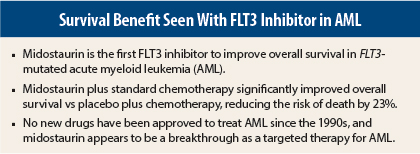Upfront treatment with midostaurin added to standard chemotherapy improved survival compared with placebo plus chemotherapy in high-risk patients with acute myeloid leukemia (AML) characterized by FLT3 mutations. No new drugs have been approved for AML since 1990, and midostaurin is the first targeted agent to improve survival in FLT3-mutated AML.
At a median follow-up of 57 months, midostaurin reduced the risk of death by 23% compared with placebo plus chemotherapy (P = .007).
These results of the multinational randomized, placebo-controlled, phase III CALGB 10603/RATIFY trial were presented at the Plenary Session of the 57th American Society of Hematology Annual Meeting and Exposition.1 The study was done in partnership with the Alliance for Clinical Trials in Oncology and Novartis.
“The overall survival results for midostaurin plus standard chemotherapy in treating FLT3-mutated AML are a long-awaited advance for hematologists and the AML community. This is the first step in applying the theories of personalized medicine to patients with AML, specifically those who have a FLT3 mutation, who we have shown are likely to benefit from the addition of this targeted agent, midostaurin, to standard therapy,” said Richard M. Stone, MD, Director of the Adult Leukemia Program, Dana-Farber Cancer Institute, Boston. “This represents a new standard of care,” he added.
About 30% of patients with AML carry an activating mutation of the receptor tyrosine kinase FLT3, either an internal tandem duplication (FLT3/ITD) or a tyrosine kinase domain (TKD). FLT3/ITD mutations are more common and are associated with aggressive disease, poor prognosis, and a higher risk of relapse. AML patients with either type of mutation were eligible for this trial. Several FLT3 inhibitors are under development, but midostaurin is the first to improve survival in FLT3-mutated patients in the context of a randomized phase III trial.
Midostaurin is an investigational multitargeted kinase inhibitor in development for the treatment of patients with AML who have a FLT3 mutation. Midostaurin inhibits multiple kinases that are involved in cancer cell proliferation, including FLT3.
RATIFY Trial Details and Results
RATIFY enrolled 717 adults with FLT3-mutated AML and randomized them in a 1:1 ratio to receive oral midostaurin or placebo in addition to standard induction (daunorubicin/cytarabine) and consolidation chemotherapy (high-dose cytarabine). Patients who achieved complete remission after consolidation chemotherapy continued treatment with single-agent midostaurin or placebo for 1 year of maintenance therapy.
Midostaurin also significantly improved event-free survival compared with placebo: Median event-free survival was 8 months for midostaurin vs 3.6 months for placebo (P = .0032), representing a 21% reduction in the risk of events favoring midostaurin.
Patients were prestratified according to three mutation subtypes: tyrosine kinase domain (TKD), internal tandem duplications (ITD) high, and ITD low. ITD mutations carry a worse prognosis, and the prognosis is less uncertain with TKD mutations. Midostaurin seemed to improve overall survival as well as event-free survival in all three FLT3 subtypes vs placebo.
Patients who achieved complete remission while taking midostaurin had a disease-free survival of 25.9 months compared with 14 months for patients achieving a complete remission while taking placebo. This implies that either the quality of remission associated with midostaurin use was better or deeper, or that maintenance therapy with midostaurin prolonged the remission (or perhaps both).
Many patients (57%) went on to undergo allogeneic stem cell transplantation in first remission, 28% in the midostaurin group and 22% in the placebo group did so; midostaurin yielded a survival benefit in patients who were censored at the time of transplant.
“Overall survival post transplant is benefited by midostaurin if the transplant is done during first remission,” Dr. Stone said.
No statistically significant differences were observed in the overall rate of grade 3 or higher hematologic and nonhematologic adverse events (except for rash/desquamation). Thirty-seven deaths were reported, and no difference in deaths or treatment was seen between the two groups.
“The study demonstrates that an international academic-industry collaborative AML study based on genotype at diagnosis is feasible,” Dr. Stone stated. “These results suggest that midostaurin plus chemotherapy should be studied in FLT3 wild-type and/or older AML patients.” ■
Disclosure: The RATIFY study was sponsored by Novartis. Dr. Stone has been a consultant for Celgene, Sunesis, Amgen, Agios, Roche/Genentech, Merck, Pfizer, Arog, Celator, Juno, AbbVie, and Karyopharm Therapeutics.
Reference
1. Stone RM, Mandrekar S, Sanford BL, et al: The multi-kinase inhibitor midostaurin prolongs survival compared with placebo in combination with daunorubicin/cytarabine induction, high-dose C consolidation, and as maintenance therapy in newly diagnosed acute myeloid leukemia patients age 18–60 with FLT3 mutations: An international prospective randomized placebo-controlled double-blind trial (CALGB 10603/RATIFY [Alliance]). 2015 ASH Annual Meeting and Exposition. Plenary Session Abstract 6. Presented December 6, 2015.



